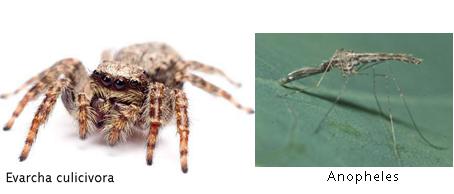Here is another method to defend against the malaria epidemic, which kills millions of people, this time "biological control" as simple as it means

Here is another method to defend against the malaria epidemic, which kills millions of people, this time "biological control" literally.
The fear of insects in general and spiders in particular is inherent in many people, it turns out that at least in the described case the fear is not justified, on the contrary, the spider pictured above is helpful!
In many cases, the spider is identified by the web it weaves to hunt its prey. There are species of spiders that hunt with a different method - by jumping quickly towards the prey, hence their popular name "jumping spider", jumping spiders are known for their ability to jump a distance 40 times greater than their body length, (the equivalent of a human jumping would be 60 meters), respectively the spider is able to see , to identify and sense the desired prey from a distance of about 1/2 meter, skills that allow them to identify and surprise their prey from a great distance.
Ximena Nelson Ximena Nelson from Macquarie University in Sydney (Australia) Macquarie University publishes the following interesting finding in LiveScience One of the jumping spider species is Evarcha culicivora that lives around Lake Victoria (Africa). Its size is about 5 mm and it is unique in its preference for mosquitoes, it turns out that the preference is not "just" for mosquitoes but rather for Anopheles mosquitoes, and not "just" for Anopheles mosquitoes, but for females, not "just" for females, but for females saturated with blood (after they have sucked blood from a victim), that is The spider has the obvious fitness and preference to identify and devour Anopheles females whose bodies contain blood. In other words, the spider's favorite prey are the female Anopheles mosquitoes whose bites spread malaria.
Nelson says that: in order to reach the find, she had to spend a long time in the Lake Victoria area where malaria is common, in order to avoid contracting the disease she had to consume drugs that caused her severe side effects including forgetfulness and dizziness, this in addition to the humid and hot climate made her work very difficult.
Since the spider prefers to stay in closed structures, it is possible that if the study was carried out in a house where there are many spiders, some of the difficulties would disappear, either way, the researcher recommends to the residents of the area not to fear the spiders, not to harm them, but to let them breed in the houses and thus reduce the risk of contracting malaria , let the spiders work for you.

2 תגובות
Dr. Hebrew Dr.... at least proofread if you don't have the skills for that. And more on the science website.
Beyond that very interesting.